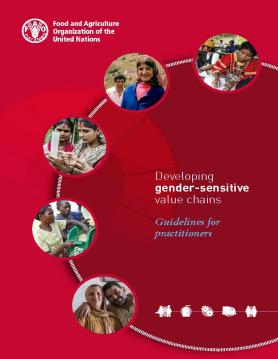You are here
Developing gender-sensitive value chains: Guidelines for practitioners
These guidelines aim to support practitioners in translating the Gender-Sensitive Value Chain Framework, developed by the Food and Agriculture Organization (FAO) into action (FAO, 2016a). These guidelines are primarily intended to assist practitioners in designing and implementing interventions that provide women and men with equal opportunities to benefit from agrifood value chain development. They offer practical tools and examples of successful approaches and case studies presented throughout the guidelines to illustrate the ways the tools were applied and the interventions that were implemented in different contexts to address specific GBCs. Fostering a more systematic integration of gender equality dimensions in value chain interventions in the agricultural sector and enhancing the social impact of these interventions.
The guidelines is targeted to practitioners in a wide range of organizations and institutions, including national governments, international and NGOs, research institutes and the private sector, in particular:
(1) Value chain practitioners who want to ensure that their interventions are inclusive and socially sustainable, and seek support on how best to address gender issues in their work on agrifood value chains;
(2) Gender experts who are tasked with supporting the integration of gender equality and women’s empowerment objectives in agrifood value chain interventions.
This publication consists of two main sections:
Part 1: Gender-sensitive analysis of the value chain presents tools and resources to assess and select value chains from a gender perspective, and guides practitioners in the identification of the gender-based constraints (GBCs) that undermine both the performance of the chain and women’s opportunities for economic empowerment.
Part 2: Actions for addressing GBCs in value chain interventions considers the key constraints that practitioners are likely to encounter when analysing agrifood value chains from a gender perspective, and explores possible solutions to address them as an integral part of the value chain upgrading strategy.
Copyright © 2020 Grow Asia Terms of UsePrivacy PolicyContact Us

